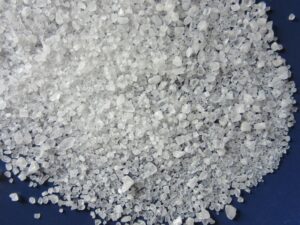This Saturday marks the end of another rifle season for deer here in the Shenandoah Valley. Although there is a late Muzzleloader season yet to come, if a deer has escaped his hunters thus far, he has fairly good odds of surviving another year if he can avoid the automobiles in the meantime.
This closing day of deer season was always one of the busiest at Bowers’ Taxidermy. For many years, the last day was the only one on which does were legal and so, in addition to many buck heads being brought in for mounting, many hides arrived for tanning as well. Some of these were to be prepared with the hair on as chair or bed covers, but most were to be made into leather for gloves, handbags, or coats. My brothers and I all took turns at the fleshing beam cutting and pulling away the excess fat and meat so that the salt, which would soon be applied, could penetrate the skin and provide the appropriate preservation.
By the end of that last day, we always had a 2-3 foot pile of hides awaiting their salt and temporary storage. It was usually after 10:00pm till the last of these was rolled up and we got to head to the house for our Saturday baths and final preparations for Sunday worship.
One the things I remember my dad saying about his trade was that the only thing that happens without work in taxidermy is decay. If skins are not handled promptly and properly, it doesn’t take long for the tissues to break down and the hide to become unusable, especially with warmer temperatures. Because of this, dad bought table salt by the fifty pound bags and used it generously to preserve the hides until the tanning could be done. The only other option was to quickly freeze items which explains why his three chest freezers always stayed full.
Although there are many ways to apply Jesus statement about His followers being the salt of the earth, salt’s preserving qualities are apparent. There is certainly much moral and spiritual decay in our world and, like animal skins, this seems to be the only direction things move in without intentional effort and hard work. Jesus knew this and commissioned His disciples to be preserving influences in our homes, communities and nations.
Being salty in the sense of moral preservation means to be holy and different among a crooked and depraved generation, even as Jesus commanded us to be. It means standing for truth even when we stand alone and it sometimes means enduring harsh criticism and condemnation. It means speaking up for godly principles and incorporating them in our homes, workplaces, community organizations, and governing structures.
If there was a corner of a skin that didn’t get salted, that portion would rot and the hair would fall out even if the rest of the hide remained intact. This reminds us of our responsibility to penetrate all aspects of our society and all corners of our world, for wherever Christ’s truth does not reach, deterioration into evil and suffering inevitably occurs.
But being Jesus’ preserving salt also means sharing food, housing, clothes, and hope with those who need them. It means being a redeeming presence with our love, care, and ministry to those who are suffering. Most importantly, it means sharing the good news of Jesus’ saving sacrifice with others, for all will perish eternally without His preserving grace.
As we contemplate the preserving qualities of salt, may they remind us to become that type of influence wherever God has placed us. May we stand for Jesus’ eternal truth and share His everlasting love with every inch of humanity.
Salty Blessings, George